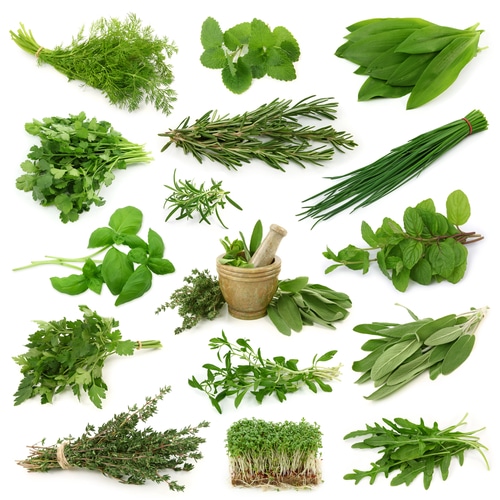 How many times have you been told to eat more fruits and vegetables? Surprisingly, fruits and vegetables aren’t the richest source of antioxidants you can add to your diet. Tasty herbs you use to flavor food are. That’s why seasoning your dishes with herbs can work in your favor from a health standpoint. Researchers at the USDA’s Agricultural Research Center looked at the antioxidant power of a variety of medicinal and culinary herbs. Surprisingly, common culinary herbs you have in your spice cabinet had more antioxidant benefits than medicinal herbs like gingko biloba and St. John’s Wort.
How many times have you been told to eat more fruits and vegetables? Surprisingly, fruits and vegetables aren’t the richest source of antioxidants you can add to your diet. Tasty herbs you use to flavor food are. That’s why seasoning your dishes with herbs can work in your favor from a health standpoint. Researchers at the USDA’s Agricultural Research Center looked at the antioxidant power of a variety of medicinal and culinary herbs. Surprisingly, common culinary herbs you have in your spice cabinet had more antioxidant benefits than medicinal herbs like gingko biloba and St. John’s Wort.
Antioxidants in Your Spice Cabinet?
If you’re a fan of Italian cuisine, you’ll be glad to know that oregano had the greatest antioxidant activity. In fact, oregano had more antioxidant power per gram than all of the fruits and vegetables they tested. For example, you’d get the same antioxidant benefits from a tablespoon of oregano as you would eating an apple. Of course, that’s not a good reason to give up apples. Apples are also rich in vitamins and fiber.
Why does oregano shine in the antioxidant department? It’s a good source of phenolic acids like thymol and rosmarinic acid that fight free radicals. Oregano has other health benefits as well. It has anti-bacterial and anti-viral properties that make it a good herb to have around during cold and flu season. It also contains an ingredient called beta-caryophyllin that has anti-inflammatory benefits.
Not a fan of oregano? Other herbs that rank high on the antioxidant scale are rosemary, dill, thyme, and peppermint. Research even shows that rosemary antioxidant activity inactivates cancer-causing compounds called HCAs that form when meat is grilled or cooked to a high heat. Some spices also have strong antioxidant activity including cinnamon, turmeric, and cloves. Herbs are derived from the leaves of plants while spices are harvested from other plant parts including stems and seeds.
Fresh Herbs: How to Get the Benefits
It’s convenient to get your herbs in a powdered form, but you may miss out on some of the antioxidant activity. Some research suggests that antioxidant activity is higher in fresh herbs than in powdered or paste forms. On the other hand, a study published in the International Journal of Food Science and Nutrition shows that even herbs in powder or paste form retain significant antioxidant activity in most cases. Use fresh herbs when possible but herbs in a paste or powdered form still have benefits.
You can buy fresh herbs in the produce department of many grocery stores. Another alternative is to plant your own indoor herb garden. All it takes is a sunny windowsill that gets at least five hours of sun a day. By growing your own, you’ll always have fresh herbs in easy reach when you’re preparing meals.
To maximize the flavor when using fresh herbs in your recipes, add them as late as possible during the preparation process. Dried herbs and spices hold up better under heat than fresh ones. Use oregano to add flavor to meat and chicken dishes, especially Italian ones. Rosemary is also a good choice for meat and poultry dishes, especially if you’re grilling. Fresh dill, another good source of antioxidants, adds flavor to chicken, seafood and is perfect for chicken salad or a cold cucumber salad. When you pour a glass of iced tea, add a sprig of mint for flavor or add mint leaves to your next omelet for a unique flavor.
The Bottom Line?
Don’t use herbs as a replacement for fruits and vegetables, but don’t ignore the antioxidant power of fresh herbs. They add flavor to foods while keeping your cells healthy.
References:
Science Daily. “Researchers Call Herbs Rich Source of Healthy Antioxidants: Oregano Ranks Highest”
Science Daily. “Try Thai Or Rosemary When Spicing The Meat To Curb Carcinogens”
Int J Food Sci Nutr. 2011 May;62(3):219-25. Epub 2010 Dec 1.
Related Articles By Cathe:
5 Myths About Antioxidants You Should Know About
Do Superfoods Live Up to Their Claims?
How Many Servings of Fruits and Vegetables SHOULD You Be Eating?

